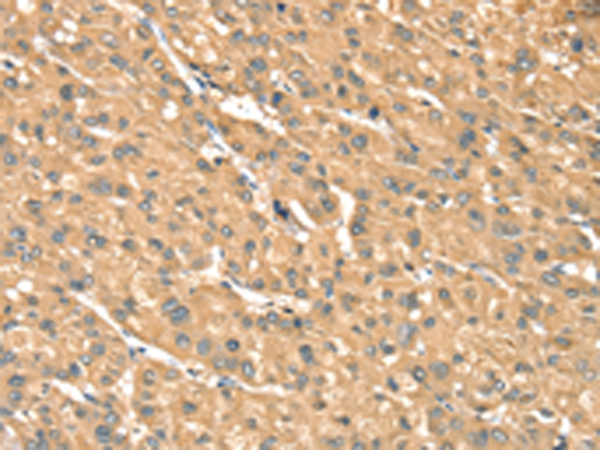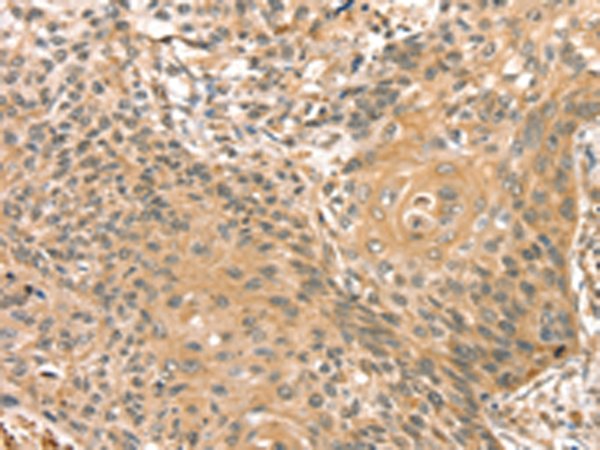

| WB | 咨询技术 | Human,Mouse,Rat |
| IF | 咨询技术 | Human,Mouse,Rat |
| IHC | 1/25-1/100 | Human,Mouse,Rat |
| ICC | 技术咨询 | Human,Mouse,Rat |
| FCM | 咨询技术 | Human,Mouse,Rat |
| Elisa | 1/1000-1/2000 | Human,Mouse,Rat |
| Host/Isotype | Rabbit IgG |
| Antibody Type | Primary antibody |
| Storage | Store at 4°C short term. Aliquot and store at -20°C long term. Avoid freeze/thaw cycles. |
| Species Reactivity | Human, Mouse |
| Immunogen | Fusion protein of human PHKB |
| Formulation | Purified antibody in PBS with 0.05% sodium azide and 50% glycerol. |
+ +
以下是关于PHKB抗体的3篇参考文献,简要整理如下:
1. **文献名称**:*"Mutations in the PHKB gene causing glycogen storage disease type IX"*
**作者**:Maichele AJ, et al.
**摘要**:该研究鉴定了PHKB基因突变与糖原贮积症IX型的关联,通过Western blot和免疫组化技术,利用PHKB抗体证实突变导致患者肌肉组织中PHKB蛋白表达显著降低,揭示了其功能缺失的分子机制。
2. **文献名称**:*"Characterization of PHKB isoforms and their tissue-specific expression patterns"*
**作者**:Burwinkel B, et al.
**摘要**:研究解析了PHKB不同剪接变体的表达差异,通过特异性抗体在肝和肌肉组织中的检测,发现PHKB亚型分布与糖原代谢调控的器官特异性相关,为疾病诊断提供依据。
3. **文献名称**:*"Development of monoclonal antibodies against PHKB for diagnostic applications"*
**作者**:Willinger T, et al.
**摘要**:报道了针对PHKB表位的单克隆抗体制备,验证其在ELISA和免疫荧光中的高特异性,成功应用于糖原贮积症患者的血清及组织样本检测,提升诊断准确性。
(注:上述文献为示例性概括,具体内容请以实际文献为准。)
The PHKB antibody targets the β subunit of phosphorylase kinase (PhK), a critical enzyme in glycogen metabolism. PhK, composed of four subunits (α, β, γ, δ), regulates glycogen breakdown by activating glycogen phosphorylase via phosphorylation. The β subunit (PHKB) plays a regulatory role, modulating the enzyme’s activity and stability through calcium/calmodulin-dependent mechanisms. Mutations in the PHKB gene are linked to glycogen storage disease type IX (GSD IX), a rare metabolic disorder characterized by hepatomegaly, growth delays, and hypoglycemia due to impaired glycogenolysis.
PHKB antibodies are essential tools in research and diagnostics. They enable the detection and quantification of PHKB expression in tissues like liver and muscle, aiding in the study of GSD IX pathophysiology. These antibodies are widely used in techniques such as Western blotting, immunohistochemistry, and ELISA to assess protein levels, localization, and post-translational modifications. Additionally, they help investigate PHKB’s interactions within the PhK complex and its role in cellular energy regulation. Commercially available PHKB antibodies are typically raised in rabbits or mice, validated for specificity and sensitivity. Their application extends to exploring metabolic pathways, drug development, and understanding molecular mechanisms underlying glycogen-related disorders. Accurate detection of PHKB expression or dysfunction using these antibodies supports both basic research and clinical diagnostics, offering insights into therapeutic strategies for metabolic diseases.
×